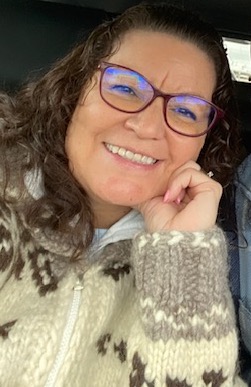#UofTGrad22: Charlotte Sampson-Elliott inspired by a goal to build trauma-informed schools in her community
Categories: Programs + Teaching, StudentsCharlotte Sampson-Elliott was an educational leader for two decades in her First Nation in British Columbia, where she worked hard to provide students with the learning opportunities and social-emotional support they needed. But she always felt there was something lacking. Now, as a new graduate of the Indigenous Trauma and Resilience field of study at U of T’s Factor-Inwentash Faculty of Social Work, Sampson-Elliott feels equipped to provide that missing piece: interventions that help children and families heal from intergenerational trauma.
“I remember when I was young and I decided I wanted to work with children, I thought we needed our own history books, because kids needed to know why things are the way they are,” says Sampson-Elliott, referring to how Indigenous people carry trauma inflicted by colonization, residential schools and the Sixties Scoop, often leading to economic, health and social inequities. “Actually, I thought parents and the whole community needed to know why things are the way they are.”
Sampson-Elliott earned her Bachelor of Education degree with the intention of becoming a teacher. Instead, she returned home to Stz’uminus First Nation on east Vancouver Island to work with her community, first on council and then as director of education. When she started in the latter position, there was only a preschool on the territory. By the time she left the job, she had also developed a primary and secondary school, allowing Stz’uminus children to complete all grades and graduate from high school within their community.
“Parents were pushing us to expand because they didn’t want their kids to leave the community for school,” says Sampson-Elliott, who completed a Master of Education degree before her Master of Social Work at U of T. “It’s still pretty tough out there for our children. They’re marginalized and there’s a lot of racism and lack of understanding. So we built schools.”
Yet overseeing construction and managing human resources was taking Sampson-Elliott away from the children themselves, so she became principal of the territory’s elementary school. “We knew the public system wasn’t working for our kids, so I didn’t want to recreate it,” she says. “My team developed a holistic program that was delivered through an Indigenous lens, with an Indigenous language program and mental health initiatives.” These things helped, but Sampson-Elliott still sensed a gap in the overall educational approach.
One of her good friends was a graduate of the first cohort in the Indigenous Trauma and Resilience (ITR) field of study, and she urged Sampson-Elliott to consider applying. Launched in 2016, the program prepares graduates to help individuals, families and communities affected by historical and intergenerational trauma in culturally relevant ways. It accepts students from around the globe, offering them a hybrid format of online and on-site courses and practicum placements in their own communities. “I was reluctant to go back to school this late in the game, but I decided to do it so I could come back to my community and implement trauma-informed schools.”
This plan changed, however, when she started her practicum at Kackaamin Family Development Centre in Port Alberni, B.C., which provides residential and day programs for children and families struggling with the effects of intergenerational trauma. “The centre has a school on site, and I immediately felt like I could support their work while continuing to learn about facilitating trauma-informed programs,” says Sampson-Elliott, who recently accepted a full-time position at Kackaamin. “I’ve seen amazing results in participants in these programs.”
The ITR program is grounded in Indigenous values and traditions, while also being informed by the latest scientific knowledge. “I see more validation in society for the merging of Indigenous wisdom with Western science,” says Sampson-Elliott. “This is exactly what we need, because they’re stronger together. I’m so optimistic. I feel like there’s a movement around understanding that healing is available and possible.”
Returning to work in her home community down the road is still a possibility, but for now Sampson-Elliott says she’s just excited to be part of this movement. “What brings comfort to my heart is knowing there are more people with this training every year. I’m just so grateful that, like me, they’re out in the world helping and healing people.”
She is also grateful for the support she received from family. “I am only able to do the work that I have done because of the values and resilience of my mom Clara and her sister Linda who raised me,” says Sampson-Elliott. “They are the first generation who got to keep their children home and raise them, and I know they did the best they could after generations of residential school trauma.”
By Megan Easton
Learn more about FIFSW’s ITR field of study
Read more student stories
- #UofTGrad22: FIFSW’s gerontology field of study strengthened Ava Bowen’s efforts to improve care for older adults
- Social work students inspire much needed research on the social services needs of Ontario’s Muslim population
- FIFSW scholarship recipients share their experiences and future goals
- How PhD student Marvelous Muchenje is harnessing the power of storytelling to effect change for African, Caribbean and Black women living with HIV
- #UofTGrad21: Terrance Lafromboise and Hyungu Kang reflect on the healing path they forged through FIFSW’s Indigenous Trauma and Resiliency field of study
